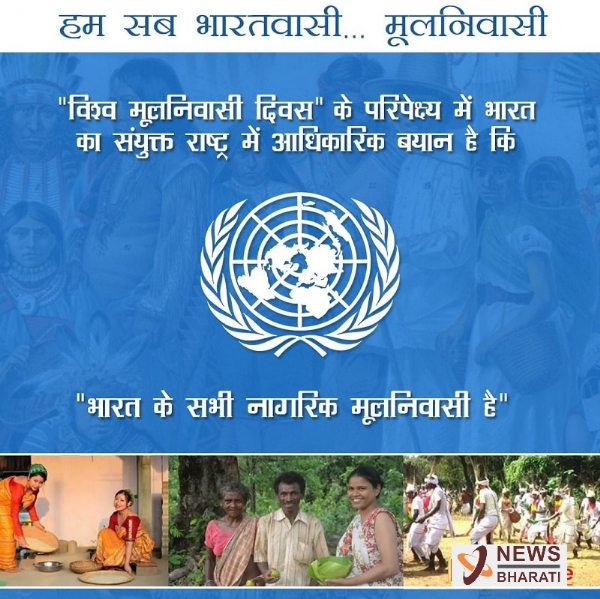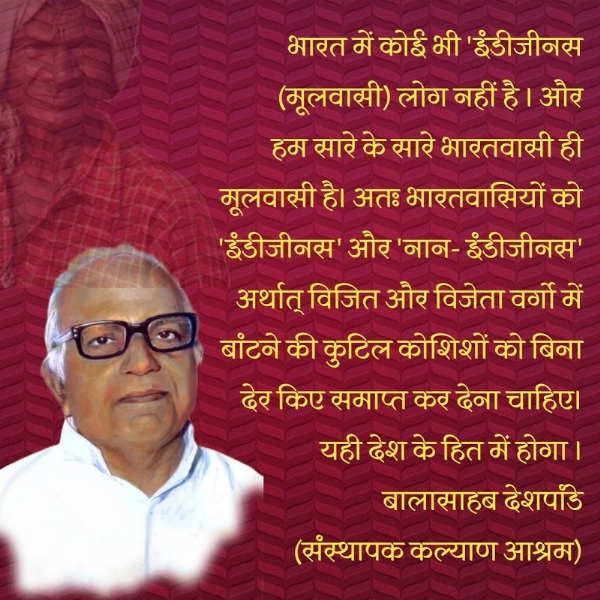#Sabhi_Bharatwasi_MoolNiwasi: Exposing the myth of indigenous peoples' day
Stalwarts and savants like Mahatma Gandhi, Thakkar Bappa, and M. S. Golwalkar had time and again expressed their dissatisfaction over splitting communities under the categories of tribals, non-tribals, etc. Gandhi had blamed the British for dividing Indians into these categories. It was the British who enrolled these forest dwellers as "tribals" in the census data then.
Total Views |
India is the second largest populated country after China and is home to diverse cultural, religious, and ethnic groups of people. The country is governed by the Constitution adopted on Nov 26, 1949, and effected on January 26, 1950. The Constitution bestows one citizenship for all its citizens irrespective of their religious, cultural, linguistic and ethnic diversities. It has adopted the principle of "One Country-One People-One Constitution-One Flag-One Law" for all citizens.

There is no definite definition of indigenous people and the United Nations also has failed to give the correct definition to describe and define them. This is a historical fact that the early Christian Missionaries who had explored far-fetched lands of the Americas, Australia, and Africa had wrenched havoc on the indigenous peoples inhabiting those lands.
They responded violently and in a most wicked manner to the welcome and treatment they received from those original people by virtually unleashing terror and violence on them. They killed them, looted them, and committed all sorts of atrocities on those simple people virtually eliminating them physically from the face of the earth.
According to Hellen Ellerby, a famous American Journalist and author, these Christian Missionary zealots destroyed and wiped out over 175 indigenous cultures from the face of the planet earth in their pursuit to spread the "Word of God".
It is, therefore, well in the interest of those original people of the Americas, Africa, Australia and New Zealand to observe the indigenous peoples' day to vent out their anger and angst against the White Collar Superior Race. The UN Declaration of 2007 on indigenous peoples also mentions the indigenous peoples as seen in the Westerrn countries. We must appreciate this and express our solidarity to those and stand with them in their efforts to regain their original status, honor and dignity.
It took the UN so many years to pass this Declaration. In 2007 the 107th Planery Meeting of the UN General Assembly passed the resolution on the "Rights of the Indigenous Peoples", thereby accepting the reality of human rights of these peoples.
While the world has to wait till 2007 for declaring that the indigenous peoples must enjoy human rights and fundamental freedom, India in her Constitution in 1950 granted legal protection to the communities residing in remote, inaccessible and forest and hilly areas to safeguard their rights. So, the very concept of observing the indigenous peoples' day is rendered absurd in the Indian context.
Stalwarts and savants like Mahatma Gandhi, Thakkar Bappa, and M. S. Golwalkar had time and again expressed their dissatisfaction over splitting communities under the categories of tribals, non-tribals, etc. Gandhi had blamed the British for dividing Indians into these categories. It was the British who enrolled these forest dwellers as "tribals" in the census data then.
It is no denying the fact that there are certain very important and serious issues concerning the welfare of the hill and forest dwellers who are wrongly described as "Tribals" in India. The present government is taking sufficient steps to ameliorate their condition by providing them opportunities and opening new vistas of development. Yet, it has to take some strong measures in respect of Forest Rights Act, and Tribal Welfare schemes.

In India, it is the voice of these elements that stands in support of the "Indigenous Peoples" of India. Their aim in propagating this is simple: To divide the Indian society. All Indians are Original citizens of India and there are no aboriginals like they were in Australia and New Zealand, or Native Americans or Africans. We are all Indians, we were Indians and will be Indians forever. Thus, the international day of the world's indigenous peoples has no relation whatsoever to the people of India.
The concept of Indigenous people - in the Indian context "Mool Niwasi" is a deep conspiracy of the Christian Missionaries and the Communists which needs to be understood and exposed for a better future. All Indians are "Mool Niwasis" and no one is aboriginal.
In the ancient period, we had a system of "Panchayat" which was comprised of five "Panchs" and one amongst them used to be from the forest dwellers. In India, all the city, village, forest, and hill dwelling communities, whether tribal or non-tribal, have always coexisted harmoniously.
Therefore, the World Indigenous Peoples Day celebration in India is inappropriate. It divides people on artificially drawn delineating lines. This is nothing but a counterproductive design.
If tribal people in India want to observe a day to commemorate their glorious past, it should be a day that has to do with our valiant heroes. How about celebrating Bhagwan Birsa Munda's birth anniversary on 15th November?
Yet, there have been voices that insist on observing the Day of the Indigenous Peoples every year on August 9. They target mainly those Indian citizens living in deep, inaccessible, remote forests, hills and vales, mountain tops and riverine plains. Therefore, it is necessary to understand the term indigenous peoples first.

There is no definite definition of indigenous people and the United Nations also has failed to give the correct definition to describe and define them. This is a historical fact that the early Christian Missionaries who had explored far-fetched lands of the Americas, Australia, and Africa had wrenched havoc on the indigenous peoples inhabiting those lands.
They responded violently and in a most wicked manner to the welcome and treatment they received from those original people by virtually unleashing terror and violence on them. They killed them, looted them, and committed all sorts of atrocities on those simple people virtually eliminating them physically from the face of the earth.
According to Hellen Ellerby, a famous American Journalist and author, these Christian Missionary zealots destroyed and wiped out over 175 indigenous cultures from the face of the planet earth in their pursuit to spread the "Word of God".
It is, therefore, well in the interest of those original people of the Americas, Africa, Australia and New Zealand to observe the indigenous peoples' day to vent out their anger and angst against the White Collar Superior Race. The UN Declaration of 2007 on indigenous peoples also mentions the indigenous peoples as seen in the Westerrn countries. We must appreciate this and express our solidarity to those and stand with them in their efforts to regain their original status, honor and dignity.
It took the UN so many years to pass this Declaration. In 2007 the 107th Planery Meeting of the UN General Assembly passed the resolution on the "Rights of the Indigenous Peoples", thereby accepting the reality of human rights of these peoples.
While the world has to wait till 2007 for declaring that the indigenous peoples must enjoy human rights and fundamental freedom, India in her Constitution in 1950 granted legal protection to the communities residing in remote, inaccessible and forest and hilly areas to safeguard their rights. So, the very concept of observing the indigenous peoples' day is rendered absurd in the Indian context.
Stalwarts and savants like Mahatma Gandhi, Thakkar Bappa, and M. S. Golwalkar had time and again expressed their dissatisfaction over splitting communities under the categories of tribals, non-tribals, etc. Gandhi had blamed the British for dividing Indians into these categories. It was the British who enrolled these forest dwellers as "tribals" in the census data then.
It is no denying the fact that there are certain very important and serious issues concerning the welfare of the hill and forest dwellers who are wrongly described as "Tribals" in India. The present government is taking sufficient steps to ameliorate their condition by providing them opportunities and opening new vistas of development. Yet, it has to take some strong measures in respect of Forest Rights Act, and Tribal Welfare schemes.
There are major issues related to healthcare, education, economic uplift and social upgrading of these communities. This needs to be done within the ambit of our constitution. But there are elements that took the advantage of these anomalies and shortcomings in the implementation of the welfare schemes to misguide, incite and provoke these tribal communities to take arms against the government. The violent movements of insurgency in the northeast, the Maoist violence in Bastar, Jharkhand, and Telangana and the support they are receiving from their "Urban Maoist" network are all self-explanatory to expose their nefarious designs.

In India, it is the voice of these elements that stands in support of the "Indigenous Peoples" of India. Their aim in propagating this is simple: To divide the Indian society. All Indians are Original citizens of India and there are no aboriginals like they were in Australia and New Zealand, or Native Americans or Africans. We are all Indians, we were Indians and will be Indians forever. Thus, the international day of the world's indigenous peoples has no relation whatsoever to the people of India.
The concept of Indigenous people - in the Indian context "Mool Niwasi" is a deep conspiracy of the Christian Missionaries and the Communists which needs to be understood and exposed for a better future. All Indians are "Mool Niwasis" and no one is aboriginal.
In the ancient period, we had a system of "Panchayat" which was comprised of five "Panchs" and one amongst them used to be from the forest dwellers. In India, all the city, village, forest, and hill dwelling communities, whether tribal or non-tribal, have always coexisted harmoniously.
Therefore, the World Indigenous Peoples Day celebration in India is inappropriate. It divides people on artificially drawn delineating lines. This is nothing but a counterproductive design.
If tribal people in India want to observe a day to commemorate their glorious past, it should be a day that has to do with our valiant heroes. How about celebrating Bhagwan Birsa Munda's birth anniversary on 15th November?



